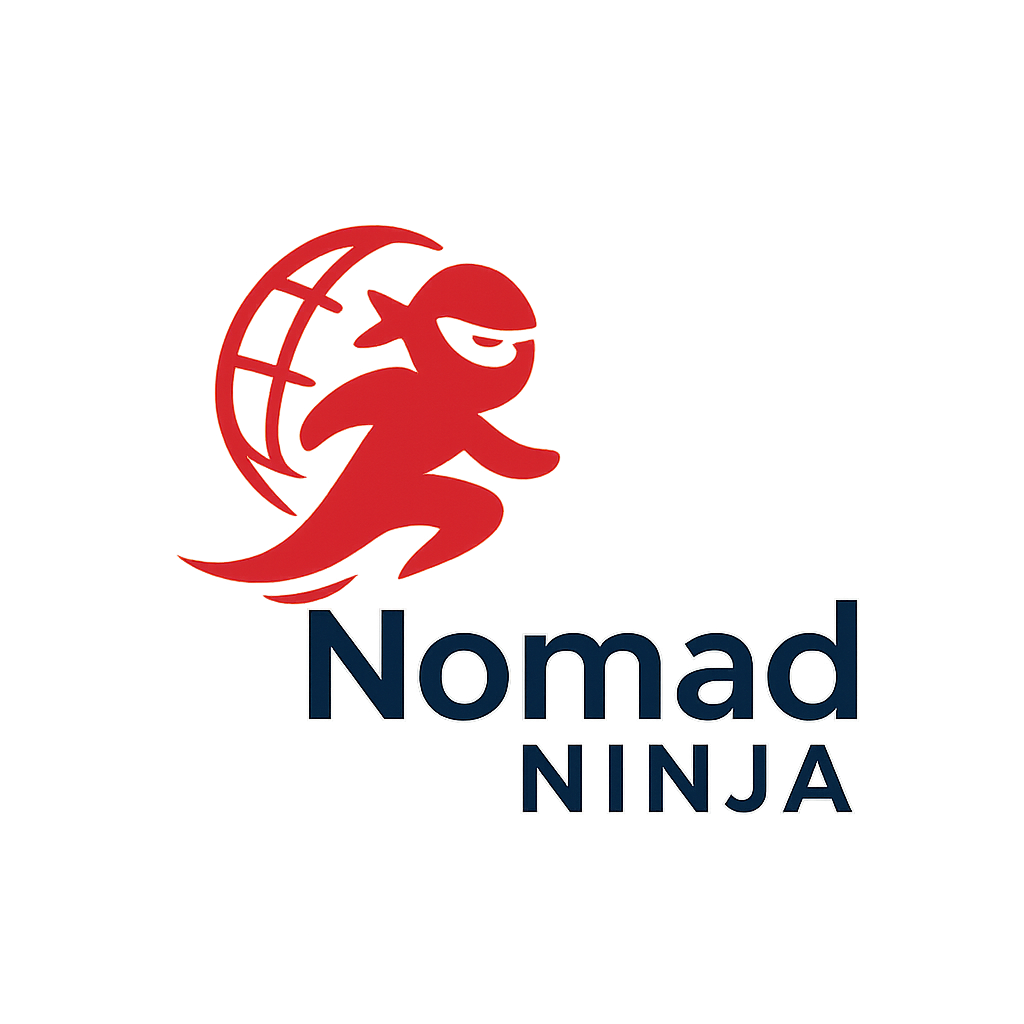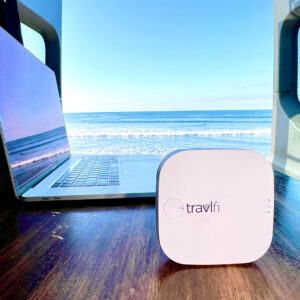This post contains affiliate links and I may earn commissions if you make a purchase.
I remember when I first stepped into the world of remote work. Phrases like ‘co-living’ and ‘geoarbitrage’ didn’t just fly over my head; they were entirely off my radar. But now, after three years as a digital nomad myself, I recognize how this jargon isn’t just fancy talk; it’s a language that encapsulates a unique way of life.
A ‘digital nomad‘ isn’t just someone with a laptop who moved to Bali. It’s a term for people who leverage technology to work remotely and live an independent, nomadic lifestyle. This lifestyle has become not just possible but also increasingly popular, thanks in large part to the digital revolution. Companies are becoming more open to remote work arrangements, and workers are eager to trade their cubicles for beachside cafés or mountaintop lodges.
But why care about the language these nomads use? It’s simple. Understanding the jargon is like getting a passphrase to an exclusive community. It’s the key to unlocking resources, forming connections, and navigating a lifestyle that merges work and travel seamlessly. This language also evolves with trends and technology, making it essential to stay informed.
Here’s my take: if you’re curious about embarking on this kind of adventure or collaborating with those who do, knowing the lingo will help. It’s about more than fitting in; it’s about embracing and understanding a culture that values freedom, flexibility, and the audacity to redefine ‘office work’.
Ready to understand more about ‘Wi-Fi triangulation’ or what exactly a ‘Nomad Cruise’ is? Let’s keep the momentum going as we dive into the technicalities and gadgets that keep digital nomads connected, no matter where they lay their hats. Read on, and prepare to get equipped with the knowledge that powers the nomadic workflow.

Travel Tech Talk: Connectivity and Gadgets
If you’re a digital nomad, or aspiring to be one, a dependable technology setup is your lifeline. It’s not just about owning a laptop and a smartphone; it’s about the supporting tech talk that goes along with this lifestyle.
When you hear someone mention ‘Wi-Fi Triangulation,’ they’re referring to a method to pinpoint your location using multiple Wi-Fi signals. It’s about being reachable and getting tasks done from any location. Next, ‘Pocket Wi-Fi’ is not just a gadget; it’s your portable doorway to the internet, a critical tool for continuous work flow.
Let’s not forget the backbone of digital security: the ‘VPN’ or Virtual Private Network. A VPN keeps your online activities secure and private, especially when you’re using public Wi-Fi networks – an inevitable aspect of the nomadic lifestyle.
“Power bank” and “noise-cancellation” are more than buzzwords; they represent your freedom and focus. Power banks ensure you’re never out of charge during critical moments, while noise-cancelling headphones enable deep work sessions, regardless of your environment.
Understanding ‘Hotspot’ is understanding flexibility. It turns your devices into a Wi-Fi hub, allowing you to work in the most remote or unusual locations. WITH THE RIGHT TECH, THE WHOLE WORLD IS YOUR OFFICE.
Nomad-Ninja Recommendation for Traveling Wifi:
Life in Transit: Accommodation and Logistics
As a digital nomad, where I lay my head at night and how I get there is as critical as staying connected. The accommodation options that suit my lifestyle aren’t the same as what you’d choose for a two-week vacation. ‘Co-living’ spaces, for instance, are a bit like modern communes specifically designed for remote workers. Picture a shared living environment that fosters community and productivity. They’re popping up worldwide, from Bali to Barcelona, offering a ready-made social network.
Then there’s ‘Airbnb’, a term that’s become almost synonymous with short-term rental solutions. But I don’t just use it for a weekend getaway. It’s often my go-to for finding a temporary home base, offering everything from a cozy studio to a room in a local’s apartment. ‘Hostel-hopping’ is another mode of accommodation I consider, especially when cutting costs is a priority. It’s not merely about bunk beds and backpackers; many hostels now cater to digital nomads, with dedicated workspaces and reliable Wi-Fi.
Now, let’s talk about getting from point A to point B. When I say I’m a ‘Slowmad’, I mean I move at a slower pace, staying in each location longer to truly immerse myself in the local culture. It’s not about ticking off countries but about forming deeper connections with places. And ‘location independence’? That’s the ultimate digital nomad dream. This term is emblematic of the freedom to choose my next destination based on where I want to be, not where I need to be for a job.
Something else I have to manage frequently is visa regulations, which often involve a ‘Visa run’—a quick trip to a nearby country to reset my visa’s clock. And since the unexpected can always happen, investing in ‘Digital nomad insurance’ is non-negotiable. It covers those unique to a nomadic lifestyle, safeguarding me from travel and health-related issues as I move globally.
So, my advice? Get familiar with these terms because they’re your toolkit for a successful nomadic life. They go beyond practicalities, shaping the entire experience of your global workspace adventure. Speaking of work, that brings us to the diverse ways digital nomads earn their keep. It’s not all about lounging on a hammock with a laptop. There’s a whole lexicon related to our jobs that’s worth exploring.

Work From Anywhere: Job Jargon
As a digital nomad, your office might be a beachfront café one day and a mountain retreat the next. To seamlessly adapt to this lifestyle, it’s crucial you grasp the types of work and project management terms that float around the digital nomad community.
Traditional job roles are often repurposed for the remote work setting. ‘Freelancing’ has become a catch-all term for self-employed individuals offering services from writing to web development. ‘Telecommuting’ denotes the practice of working remotely, particularly for employees within traditional companies. Lastly, ‘Remote work‘ is perhaps the broadest term encompassing any employment that doesn’t require the worker to be physically present at a company’s headquarters or offices.
With projects scattered across various time zones, mastering terms like ‘Asynchronous communication’ is vital. It refers to the exchange of information without the requirement of real-time interaction. Appreciating ‘Time zone overlap’ is also key, especially for teams; it’s the window during work hours when remote team members are all available to communicate.
Your financial success as a digital nomad may hinge on your understanding of ‘Passive income’ streams—earnings that require little to no active work to maintain, like rental income or earnings from an e-book. ‘Geoarbitrage’ takes advantage of the economic differences between locations; it’s about earning money in a strong currency and spending in a weaker one, thereby maximizing your purchasing power.
Nomad-Ninja passive income choice: Affiliate Marketing!
Now, let’s shift gears to the social aspect. It’s one thing to decode the work-related lingo; it’s another to navigate the social seas of digital nomadism. The community you engage with can profoundly influence both your work and your experience as a nomad.
The Digital Nomad Community: Social Terms
Integration into the digital nomad community can enrich your journey considerably. It’s not just about trotting the globe; it’s about the people you meet along the way. As a digital nomad myself, I can’t stress enough the value of community. Here’s some of the lingo that’ll help you navigate the social seas.
The term ‘nomad hub’ refers to cities or places known for their favorable conditions for digital nomads. Think affordable living costs, plenty of coworking spaces, and a vibrant community. Examples include places like Chiang Mai, Bali, or Lisbon.
‘Coworking space’ is a phrase you’ll hear often. These are shared offices where digital nomads, freelancers, and remote workers gather to do their work. Beyond just working, these spaces often host events and create opportunities for networking.
Networking is a massive part of the nomadic lifestyle. Terms like ‘Meetup’, ‘Remote Year’, and ‘Nomad Cruise’ are vital for you to know. A ‘Meetup’ is an informal gathering or an event organized online that brings people with common interests together. ‘Remote Year’ is a program offering a year of travel while working remotely, and ‘Nomad Cruise’ is a networking event on a cruise ship for digital nomads.
Understanding the demographic terms can also provide insight. ‘Solo nomad’ refers to an individual traveling and working alone, while ‘Digital nomad family’ is self-explanatory – families embracing a nomadic, remote-working lifestyle.

In summary, knowing these terms helps build your digital nomad CV, not just for small talk, but for creating genuine connections. Strong networks can lead to new opportunities, both professionally and personally.
Balancing Work and Play: Lifestyle Lingo
As a digital nomad, separating ‘work’ from ‘play’ isn’t just a recommendation; it’s essential for a sustainable lifestyle. You may come across terms like ‘workation’ or ‘bleisure’, which reflect the blend of business and leisure many nomads experience. A ‘workation’ is essentially a vacation that allows for work intervals, offering a scenic change without stalling professional obligations. ‘Bleisure’, mixing business with pleasure, often happens when you extend a business trip for leisure purposes. Staying grounded also involves health and wellness. Phrases such as ‘digital detox’—where you unplug from technology to recharge—and ‘mindfulness’, focusing on the present moment, are critical to your well-being as a nomad. Among the tools for managing time, you might adopt the ‘Pomodoro Technique’, working in focused sprints with short breaks, or ‘time blocking’, dedicating specific blocks of time to tasks, to maximize efficiency and guarantee time for relaxation.

While balancing your work and leisure activities, understanding the laws and regulations of your nomadic lifestyle becomes vital. The upcoming section, ‘Navigating Legalities and Ethics: Know Your Terms’, acknowledges this critical aspect. It delves into the various legal jargons like ‘residency by investment’ and ‘tax haven’, which you’ll need to understand to navigate the finance and legality dimensions of digital nomadism. Ethical considerations are equally crucial. Terms like ‘data privacy’ and ‘eco-travel’ underscore the responsibility you hold not only towards the clients you service and business you run but also towards the environment and the global digital community you engage with. Grasping the subtleties of these terms will better equip you to thrive as a responsible digital nomad.
Navigating Legalities and Ethics: Navigating the Rules of the Road
I’ve shared quite a journey with you, decoding the eclectic jargon that belongs to the digital nomad lifestyle. I hope the glossary of terms I’ve provided not only makes the dialogue around digital nomadism more accessible but also aids you in navigating the often complex lifestyle with greater savvy.
When it comes to the legal and ethical aspects of nomadism, it’s essential to grasp the terms that relate to visas, taxes, and digital behavior. ‘Residency by investment’, ‘tax haven’, and ‘fiscal residency’ are more than buzzwords; they’re crucial aspects that affect your legal standing and financial health.
Moreover, ethics and responsibility shouldn’t be afterthoughts. Whether it’s understanding data privacy to protect your digital footprint or embracing eco-travel to mitigate environmental impact, these terms represent key areas of accountability.
Remember, digital nomadism is about freedom and flexibility, but it’s also tethered to the responsibility of adhering to international laws and ethical norms. Treat these legalities and ethical considerations with the respect they deserve, and you set yourself up for a rewarding and sustainable nomadic lifestyle.
So, keep this guide handy as you venture into the nomadic world. Whether you’re ironing out your SLA for a new client or ensuring your intellectual property is safeguarded across borders, a clear understanding of these terms will serve as your compass.
Stay curious, stay informed, and above all, stay LEGAL. The world is vast, and as you navigate its breadth and depth, may your experiences be as enriching as they are compliant. Safe travels and happy nomading!





Leave a Reply